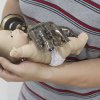Even though prostheses can accomplish many tasks, they often lack the capability to provide feedback to the user such as differences in temperature or pressure. Researchers from South Korea and the U.S. have created a prosthetic skin that is infused with roughly 400 S-shaped silicon and gold sensors per square millimeter that are able to compress and expand.
In order to design this prosthetic to be as close as possible to actual skin, the group also studied the motion of body parts such as the hand. They were able to see which parts of the hands moved less and placed more sensors there. For example, a greater number of sensors were placed on finger tips where flexibility is not as critical as in the wrist.
There are still many limitations that exist in this study. The researchers tested this device on rats and observed that it successfully sent signals to the rats’ brains; however, they do not know to what extent the rats felt these signals. Further studies require the testing of this device in higher level organisms to determine how sensitive this device is and whether or not it is viable for human use.
From the study in Nature Communications:
Here we demonstrate smart prosthetic skin instrumented with ultrathin, single crystalline silicon nanoribbon strain, pressure and temperature sensor arrays as well as associated humidity sensors, electroresistive heaters and stretchable multi-electrode arrays for nerve stimulation. This collection of stretchable sensors and actuators facilitate highly localized mechanical and thermal skin-like perception in response to external stimuli, thus providing unique opportunities for emerging classes of prostheses and peripheral nervous system interface technologies.
source::newsroom.ucla.edu
Smart Artificial Skin to Complement Prosthetics

